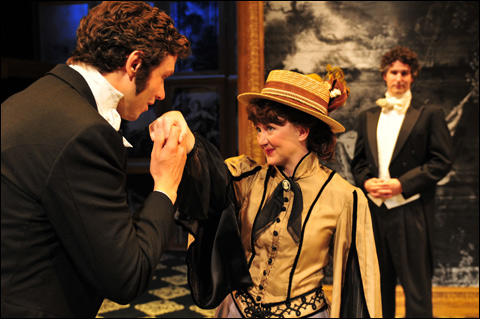
WHERE’S THE EXCESS? When doing Oscar Wilde, less is not always more. |
"Nothing succeeds like excess," Oscar Wilde famously opined. So it's hard to imagine what the author of An Ideal Husband would make of being downsized. But that's what happens in Daniel Morris's adaptation of the play, which was first performed by Morris's own Bad Habit Productions and is being revived by Gloucester Stage Company (through August 29), under the direction of Elliot Norton Award winner Karen MacDonald. Morris reduces the character count from 15 to 11, then sets things up so that four performers can play (or share) all of the parts — which probably ensures that what goes on backstage, where the costume changes take place, is livelier than much of what transpires on Julia Noulin-Merat's set, a series of framed black-and-white images built around the tapestry Wilde puts centerstage and suggesting the blurring of the moral spectrum.
Morris's treatment pares down the cast better than it does the four-act script, a mix of aphoristic sparkle and marital melodrama in which a "woman with a past" turns up bearing a secret that threatens to turn an exemplary young politician's public and personal households topsy-turvy. It is hardly Morris's fault that Wilde — poised for his masterpiece, that "trivial comedy for serious people," The Importance of Being Earnest — was still mixing his gleaming witticisms and guerrilla attacks on hypocritical Victorian morality into wanna-be Ibsen. But neither the adaptation nor MacDonald's production ameliorates the desperate doings of the suds-soaked plot. (Someone has, however, wisely blue-penciled the stuff about men's lives being "of more value" than women's.) Indeed, the production is at its most crackling when it goes at Wilde's script — hand wringing, social preachment, and all — wholeheartedly. The insertion of drag and other campy elements just makes more jarring the contrast between untwining melodrama and elegant mockery.
At the center of the whirl is Sir Robert Chiltern, an ambitious pol whose rigidly reputable wife considers him a paragon. When poised siren Mrs. Cheveley turns up wanting to trade damaging evidence of the dishonorable act that got Chiltern his start for some political spin that will protect her sizable investment in a South American speculation, Chiltern is stuck between a rock and a hard place. With him in that well-appointed crevice is best pal and Wilde spokesperson Lord Goring, an idle if impeccable dandy with all of the answers impeccably parsed. At Gloucester Stage, these two are well played by Brendan Powers, desperate yet fiery as Chiltern, and Lewis D. Wheeler, openly vain, cryptically clever, but also kindly as Goring. It's only when the two are deployed in secondary roles — doddering or female — that they make one's trigger finger itch.
The two women keeping up with them are less imposing, with Angie Jepson sly if hardly formidable as flame-haired Mrs. Cheveley and striding as Mabel Chiltern, Robert's flirtatious sis, whose spousal expectations Wilde paints as more realistic and refreshing than those of the priggish Lady Chiltern. Carrie Ann Quinn is saddled with the difficult task of rendering this disdainful paragon maker — "pitiless in her perfection" — empathetic. Quinn's pursed-lipped acolyte does gradually acquire some vulnerability. But it's hard to forgive the actress her splay-legged, fake-bearded turn as Lord Goring's starchy old fart of a father. Although one accepts in a low-budget production of a high-style play some (primarily sartorial) compromises, these do not extend to thespian shenanigans better suited to an amateur Charley's Aunt.